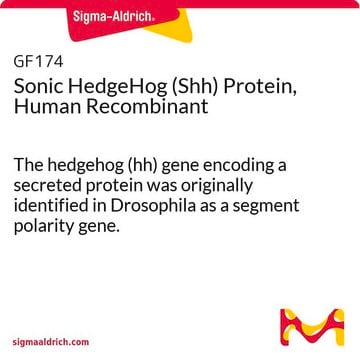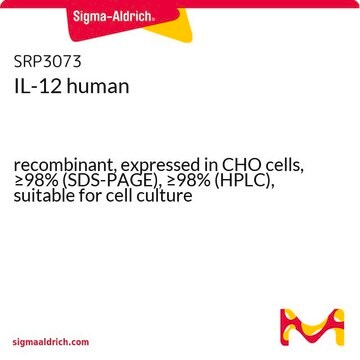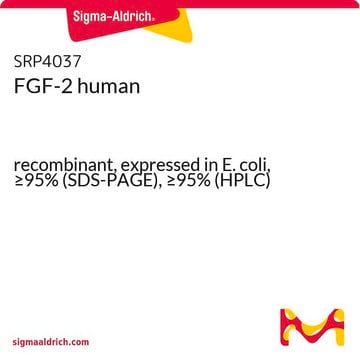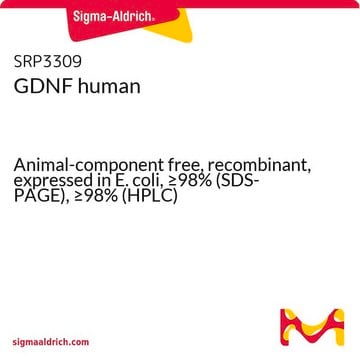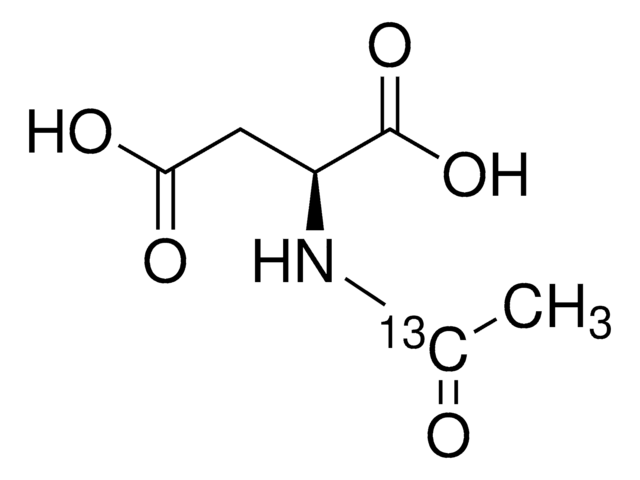SRP3156
Sonic Hedgehog human
Animal-component free, recombinant, expressed in E. coli, ≥98% (SDS-PAGE), ≥98% (HPLC), suitable for cell culture
Sinónimos:
HHG-1
Iniciar sesiónpara Ver la Fijación de precios por contrato y de la organización
About This Item
UNSPSC Code:
12352200
NACRES:
NA.32
Productos recomendados
biological source
human
recombinant
expressed in E. coli
assay
≥98% (HPLC)
≥98% (SDS-PAGE)
form
lyophilized
potency
0.8-1.0 μg/mL ED50
mol wt
20.0 kDa
packaging
pkg of 25 μg
technique(s)
cell culture | mammalian: suitable
impurities
<0.1 EU/μg endotoxin, tested
color
white
UniProt accession no.
shipped in
wet ice
storage temp.
−20°C
Gene Information
human ... SHH(6469)
General description
The sonic hedgehog protein is encoded by the SHH gene that is mapped to human chromosome 7q36. It is homologous to the Drosophila segment polarity gene hedgehog. The encoded protein is a 45kDa precursor protein that is auto-cleaved to form SSH-N (an amino-terminal 20kDa product) and SSH-C (carboxy-terminal product). SSH-N is found to be cell-associated, while SSH-C diffuses freely. Recombinant E. coli derived Human Sonic HedgeHog is a 20.0 kDa protein consisting of 176 amino acid residues, including an N-terminal Ile-Val-Ile sequence substituted for the naturally occurring chemically modified Cys residue.
Application
Sonic Hedgehog human has been used:
- To study its role in liver cancer stem cell activity.
- For neuronal differentiation.
- For cholinergic-like neurons (ChLNs) differentiation.
The sonic hedgehog protein is used in neuronal induction medium as a supplement.
Biochem/physiol Actions
The SHH (sonic hedgehog) gene encodes a soluble signaling protein that functions in the patterning of cell differentiation in the neural tube and limb bud. It has also been implicated in several processes, such as developing nervous system, including midbrain and ventral forebrain neuronal differentiation and neuronal precursor proliferation. In adults, it regulates progenitor function and proliferation. Mutations in this gene have been associated with holoprosencephaly, a developmental defect of the forebrain and midface.
Sequence
IVIGPGRGFG KRRHPKKLTP LAYKQFIPNV AEKTLGASGR YEGKISRNSE RFKELTPNYN PDIIFKDEEN TGADRLMTQR CKDKLNALAI SVMNQWPGVK LRVTEGWDED GHHSEESLHY EGRALDITTS DRDRSKYGML ARLAVEAGFD WVYYESKAHI HCSVKAENSV AAKSGG
Physical form
Lyophilized with no additives.
Reconstitution
Centrifuge the vial prior to opening. Reconstitute in water to a concentration of 0.1- 1.0 mg/ml. Do not vortex. This solution can be stored at 2-8°C for up to 1 week. For extended storage, it is recommended to further dilute in a buffer containing a carrier protein (example 0.1% BSA) and store in working aliquots at -20°C to -80°C.
Storage Class
11 - Combustible Solids
wgk_germany
WGK 3
flash_point_f
Not applicable
flash_point_c
Not applicable
Elija entre una de las versiones más recientes:
¿Ya tiene este producto?
Encuentre la documentación para los productos que ha comprado recientemente en la Biblioteca de documentos.
The SHH/Gli axis regulates CD 90-mediated liver cancer stem cell function by activating the IL 6/JAK 2 pathway
Zhang K, et al.
Journal of Cellular and Molecular Medicine, 22(7), 3679-3690 (2018)
Direct transdifferentiation of human Wharton?s Jelly mesenchymal stromal cells into Cholinergic-like neurons
Mendivil-Perez M, et al.
Journal of Neuroscience Methods (2018)
Mutations in the human Sonic Hedgehog gene cause holoprosencephaly.
Roessler E
Nature Genetics, 14, 357-360 (1996)
Sonic hedgehog regulates adult neural progenitor proliferation in vitro and in vivo.
Lai K
Nature Neuroscience, 6, 21-27 (2003)
Use of human induced pluripotent stem cell-derived neurons as a model for Cerebral Toxoplasmosis.
Tanaka N
Microbes and Infection, 18, 496-504 (2016)
Nuestro equipo de científicos tiene experiencia en todas las áreas de investigación: Ciencias de la vida, Ciencia de los materiales, Síntesis química, Cromatografía, Analítica y muchas otras.
Póngase en contacto con el Servicio técnico